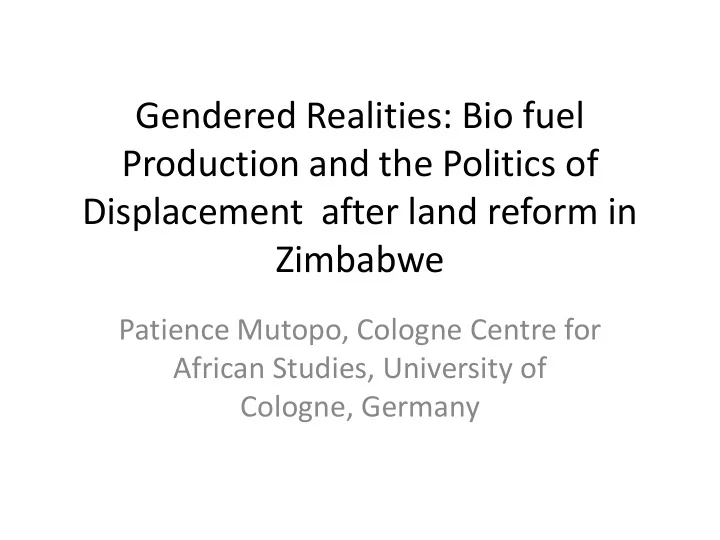

Gendered Realities: Bio fuel Production and the Politics of Displacement after land reform in Zimbabwe Patience Mutopo, Cologne Centre for African Studies, University of Cologne, Germany
Study area
Description of study area • Study undertaken at Chigwizi village, an informal ( formal settlement) in Nunaetsi Ranch • Nuanetsi located in Masvingo Province, natural region( 4 or 5), mixed soils, black, red, white • 3 km from the R1 highway that connects Chirundu and Beitbridge • Chigwizi located in the Southern part of Nuanetsi • 232 families currently occupying Chigwizi village
Patience within the Nuanetsi ranch territory
Methodology and Data analysis • Ethnography • Focus Group Discussions • Indepth Interviews • Analysis based on focussed coding were themes that emerged from the interviews, FGDs and own observations were sorted on cards and recurring issues with semblance were developed into themes.
Ethnographic experiences
Bio fuels and land Land reform • Settlers occupied the land in 2000 during the fast track land reform programme. • They migrated to Chigwizi, Nuanetsi from surrounding communal areas of Lundi, Neshuro, Matibi, Chiredzi • Land accessed through participation in the mayhem mostly.
• Women, men and children constitute the inhabitants of the households at Chigwizi • Settlers have 6 hectares of farming land and share grazing lands of between 30 to 50 hectares.
Female settlers at Chigwizi
Male settlers at Chigwizi
Politics of land, bio fuels • In February 2010, government announced that settlers at Chigwizi village had to leave the land as the land was never gazetted for resettlement. • Role of state , non state actors and individuals. • Men and women had curved livelihoods on this land for the past 10 years through rain fed agriculture. • District and Provincial land committees endorsed decision of the displacement of the men and women
Perceptions of men and women • Men and women argue that they were never part of the negotiations of their removal from Chigwizi. • Government and local authority pointed out that the families would be settled North of the Torkwe Murkosi dam in Chivi. • Traditional authorities in the village were not notified men and women are adamant that they will not move since they are the occupiers of the land.
Why the displacement after 10 years? • Bio fuel Production on large scale, consortium of former white commercial farmers have accessed the land at Nuanetsi which constitute more than 1% of land in the country. • Government insists that bio fuels will boost economic activity, lead to employment creation. • Role of politics and economics in land management at Chigwizi.
Gendered Analysis • Men and women disadvantaged since they all lose their right to land, livelihood and hence compromising their access to land a major source of livelihood in Zimbabwe. • With regards to the control and activity profiles, women at Chigwizi are more vulnerable to displacement since most of them do not own land as individuals, displacement to Torkwe will mean more roles in terms of clearing the new land, searching for alternative food sources, Tokwe- Murkosi is in Chivi South which is traditionally prone to droughts. • Land a resource heavily contested with customary and formalization processes, affecting women `s access and control.
Cont • Land a contested resource, with customary and formalization processes that lead to the unequal outcomes of access between men and women. Men control land in fast track farms. • Women more disadvantaged because in terms of social differentiation some are widows, single and hence access to land without a male figure head is problematic.
Cont Men are losing land they have farmed and since they • are being moved to a communal areas, traditional authorities tend to favour them in terms of land access and control. • Both men and women affected negatively by displacement as they have invested at Chigwizi, I argue that women tend to be negatively affected in displaced rural communities as they lack the bargaining power to fight land wars which have always been a male preserve threatening their livelihoods and those of the children they look after.
• Bio fuel in terms of land reform affecting men and women because of the lack of formal title to land, (contested terrain). • However women more affected because they mostly have been subjected to tenure insecurity. • Bio fuels at Chigwizi have led the men and women to feel that government is prioritizing, crocodile farming and energy over the lives of the people. • Perceptions of men and women reveal that there is now a problem with permanent land based livelihoods in the post fast track land reform programme.
Conclusion • Politics of displacement with regards to bio fuels at Chigwizi highly debatable, livelihoods of men and women compromised and losing a right to land. • Politics of livelihoods, land acquisition and creation bio fuel centred economies. • Women more disadvantaged as they have always lacked bargaining power at the land negotiating table, only 18% accessed land during fast track.
• Men and women feel unfairly treated and they feel that the gains of the land reform being reversed. • Chigwizi could be a potential source of conflict after the fast track land reform, beneficiaries s are mostly ordinary people. • Men and women should have a voice in bio fuel led projects especially in situations were they have been radical land reforms meant to reindigenise the land and agriculture. • Policies that recognize the unequal land access and utilization in situations were women are the major providers of labour in agricultural activities.
Recommend
More recommend